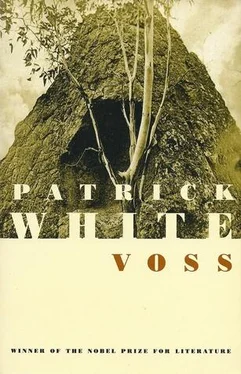She was quite unlike Miss Belle. On those suffocating days when the change would not come, and the feet crushed a scent out of the fallen camphor leaves, Miss Belle would be crying out loud, and fanning herself, and pushing back her hair to be rid of its weight, but would not escape, it was seen by people passing the other side of the wall; Miss Belle remained dripping gold. Or in the grey gales of afternoon, when at last they came, the great round gusts that smote the camphor trees, Miss Belle would catch up her skirt, and run at the wind, and drink it, and feel it inside her dress, and shout, even, until her mother or cousin would hush her. Yes, Miss Belle was the lively one.
So the life of the garden merged with the thoughts of the passers-by. The flickery muslins and the brooding leaves obsessed the more speculative. Indistinct voices would follow them to distant quarters of the town, almost always the voices of ladies, devoted to those pursuits to which ladies do devote themselves, because they must pass the time.
‘Oh dear, I would write a letter,’ Belle might say, ‘if I had not written to everyone.’
She had, too, but she did receive in return many informative letters from other girls.
‘I would not know to whom I might write,’ Laura replied on such an occasion.
They were sitting in the latticed summer-house, from which the wistaria from China hung its buzzing, drunken heads.
‘But there is everyone,’ Belle replied. ‘There is Chattie Wilson, and Lucy Cox, and Nelly McMorran. And everyone.’
‘Or that I would find a subject of sufficient interest.’
‘That is not necessary,’ said Belle. ‘One simply writes.’
Time was heavy, although, in the afternoon, Tom would come.
‘Papa is surprised he has had no word from the expedition,’ Belle rattled, to save herself. ‘He would not expect, of course, civility from Mr Voss, but he did fancy Mr Sanderson might keep him informed, on that stage of the journey at least.’
‘It is early yet,’ suggested Laura, who was sketching the garden from an angle that had only recently occurred to her.
‘Or Mr Palfreyman,’ said Belle. ‘Mr Palfreyman could, and ought to, write.’
She did not look at her cousin.
Laura frowned at the garden.
‘It is not his duty. He is not the leader of the expedition.’
‘Dear Lolly,’ sighed Belle, taking her cousin’s hand as if it had been a cat to cuddle.
‘You are absurd, Belle,’ laughed Laura, to whom perspective was a problem.
‘But you found Mr Palfreyman agreeable. You admitted it yourself. The day the ship sailed.’ For Belle Bonner, her cousin was a fascinating mystery, whether sketching from the summer-house or taking her leave of suspected admirers. ‘Such an amiable man, Mamma considers.’
‘Most amiable,’ Laura agreed.
‘Even Tom feels — because I have asked him — that Mr Palfreyman is so good . Of delicate constitution, perhaps. Still, delicacy of health can make a man considerate of others.’
Laura was entertained.
‘Is that also Tom’s opinion?’
‘No. Mamma’s.’ Belle blushed.
‘Then, poor Mr Palfreyman has been discussed.’
‘Dear Laura, I could be so happy.’ Belle caressed her cousin’s hand.
It was exasperating. She would have forced those she loved to eat of sweets she had not yet tasted.
But Laura laughed. She withdrew her hand, and took the pencil to her sketch, and ploughed it with one long, dark line, almost through the paper.
‘You have spoilt your sketch!’ cried Belle.
‘Yes,’ said Laura. ‘It was an insipid thing.’
She crumpled it up, and dared her dear Belle.
At that season, Laura’s glistening, green laughter was threaded through the days. These were warm, though not yet oppressive, full of the clovey scent of pinks, with harsh whiffs of torn gum-leaves, dissipated by the wind, and married with perfume of roses, in passionate gusts. Heady days. Green was garlanding the windows, the posts of balconies, the knobs of gateways, in celebration.
In celebration of what, others did not know, except that there was something. They were looking at Laura for some sign, as she moved in the garden, in a crush of cool flowers, or appeared suddenly in doorways, in the sound of her skirts, or under trellises, trailing a dappled shadow, or at windows, that she threw open suddenly, her arms flying upward after the sash, to stay suspended there a second, the greenish flesh of those stalks glimmering against vines. All these acts were joyful, without revealing. Her mouth did not so much smile, as wonder.
For Laura herself had not yet grasped the full sense of that season, only that it was fuller than ever before, and that the flesh of roses was becoming personal, as she cut the long, pointed buds, or heavy blooms that would fall by evening. She had to take all, even the big, blowing ones.
‘Those will make a mess, miss,’ Rose Portion did protest once.
She was holding the basket.
‘Yes,’ said Laura. ‘I am aware of that.’
‘Tt-tt-tt!’ sighed the brown woman. ‘All over the tables and carpets. A mess of rose petals.’
But the girl was dazed by roses. She continued to cut the big heads, in which bees were rummaging. She bent to reach others, till roselight was flooding her face, and she was forced to lower the lids of her eyes against the glare of roses. Then she became caught. It was one of the older, the more involved, the staggier bushes, of sinewy black wood. She was held. Neither one way nor the other was it possible to move, however she shook the tough bush. She began to laugh, mirthlessly, out of exasperation for her powerlessness, and call:
‘Help me, Rose! Where are you? Do something!’
The woman set down the basket then, and freed her mistress easily.
The girl was laughing, though blushing, because she was really rather annoyed.
‘Can you see whether I am torn?’ she asked.
‘Not that I can notice,’ Rose replied, ‘but I expect.’
Controlling her wind, the woman picked up the basket. This business of flowers was not her work, but it pleased her to do it, and since she had grown heavy, the people of the house humoured her.
Although Mrs Bonner, who had just come out upon the balcony, stood frowning down. At the back of her mind, there was always Rose.
Once Mrs Bonner had gone to her niece at an awkward and unexpected moment, as the latter was practising a new piece, and sat beside her, and said, there and then:
‘We must really think, Laura, what is to be done about Rose. I understand there is a Mrs Lauderdale, who has founded some institution to provide for women in that condition, during, or perhaps it is for afterwards, the unfortunate children, I do not know, but must consult Mrs Pringle, and think.’
Then Aunt Emmy looked right up into her niece’s face, as if she had been a tree with something hiding in it, and not a young woman engaged upon an arpeggio.
‘Yes, Aunt. Of course,’ said Laura, who suffered all the difficulties of music.
Laura is selfish, Mrs Bonner sighed.
‘Nobody will help me,’ she murmured.
So she went away.
Now Laura could see her aunt upon the balcony, threading the ribbon through a clean cap, but looking, instead, at Rose.
Rose looked, and saw, and understood — there was very little she did not — and said:
‘There is Mrs Bonner. She could be wanting something of me.’
‘I do not think so,’ said Laura firmly.
Laura Trevelyan had given much consideration to the question of Rose Portion, but the answer to it was withheld. She did not fret like her aunt, although it concerned her personally, she sensed, even more personally. For personal reasons, therefore, she would continue to give the matter thought, although her faith in reason was already less. She would prepare her mind, shall we say, to receive revelations. This preoccupation, which was also quasi-physical, persisted at all times, though most in the overflowing garden, of big, intemperate roses, with the pregnant woman at her side. At such times, the two shadows were joined upon the ground. Heavy with the weight of golden sun, the girl could feel the woman’s pulse ticking in her own body, and was, in consequence, calmer than she had ever been, quietly joyful, and resigned. As she strolled towards the house, holding her parasol against the glare, though devoured by the tigerish sun, she trusted in their common flesh. The body, she was finally convinced, must sense the only true solution.
Читать дальше












